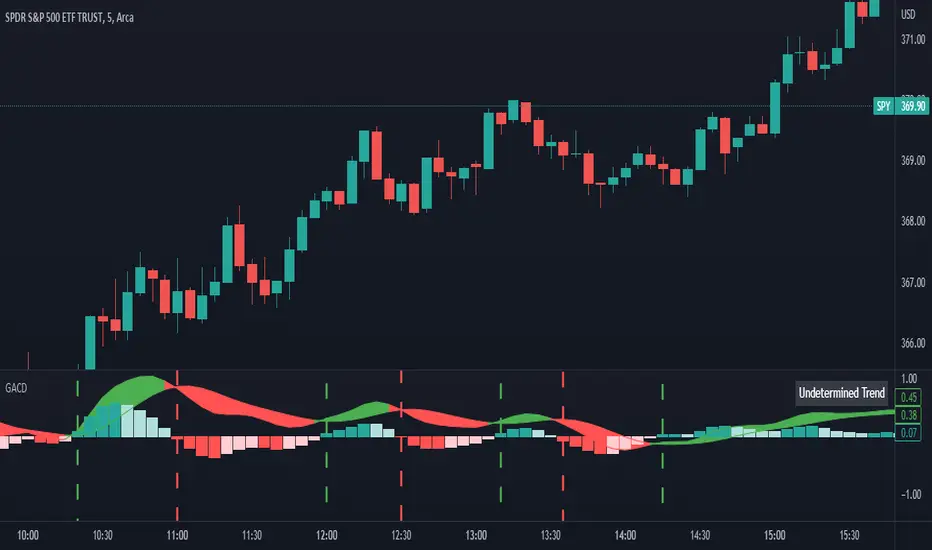OPEN-SOURCE SCRIPT
Gaussian Average Convergence Divergence

What exactly is the Ehlers Gaussian filter?
This filter is useful for smoothing. It rejects higher frequencies (fast movements) more effectively than an EMA and has less lag. John F. Ehlers published it in "Rocket Science For Traders." Dr. René Koch was the first to implement it in Wealth-Lab.
The transfer response of a Gaussian filter is described by the well-known Gaussian bell-shaped curve. Only the upper half of the curve describes the filter in the case of low-pass filters. The use of gaussian filters is a step toward achieving the dual goals of lowering lag and lowering the lag of high-frequency components relative to lower-frequency components.
From Ehlers Book: "The first objective of using smoothers is to eliminate or reduce the undesired high-frequency components in the price data. Therefore these smoothers are called low-pass filters, and they all work by some form of averaging. Butterworth low-pass filters can do this job, but nothing comes for free. A higher degree of filtering is necessarily accompanied by a larger amount of lag. We have come to see that is a fact of life."
References John F. Ehlers: "Rocket Science For Traders, Digital Signal Processing Applications", Chapter 15: "Infinite Impulse Response Filters"
This filter is useful for smoothing. It rejects higher frequencies (fast movements) more effectively than an EMA and has less lag. John F. Ehlers published it in "Rocket Science For Traders." Dr. René Koch was the first to implement it in Wealth-Lab.
The transfer response of a Gaussian filter is described by the well-known Gaussian bell-shaped curve. Only the upper half of the curve describes the filter in the case of low-pass filters. The use of gaussian filters is a step toward achieving the dual goals of lowering lag and lowering the lag of high-frequency components relative to lower-frequency components.
From Ehlers Book: "The first objective of using smoothers is to eliminate or reduce the undesired high-frequency components in the price data. Therefore these smoothers are called low-pass filters, and they all work by some form of averaging. Butterworth low-pass filters can do this job, but nothing comes for free. A higher degree of filtering is necessarily accompanied by a larger amount of lag. We have come to see that is a fact of life."
References John F. Ehlers: "Rocket Science For Traders, Digital Signal Processing Applications", Chapter 15: "Infinite Impulse Response Filters"
릴리즈 노트
- Made some changes that optimized the code- Added different customization options
- Chart Updated
릴리즈 노트
- Fixed bug with colors- Added custom band settings
릴리즈 노트
- Updated more customization options for vertical line릴리즈 노트
- Updated bug with band fill오픈 소스 스크립트
트레이딩뷰의 진정한 정신에 따라, 이 스크립트의 작성자는 이를 오픈소스로 공개하여 트레이더들이 기능을 검토하고 검증할 수 있도록 했습니다. 작성자에게 찬사를 보냅니다! 이 코드는 무료로 사용할 수 있지만, 코드를 재게시하는 경우 하우스 룰이 적용된다는 점을 기억하세요.
면책사항
해당 정보와 게시물은 금융, 투자, 트레이딩 또는 기타 유형의 조언이나 권장 사항으로 간주되지 않으며, 트레이딩뷰에서 제공하거나 보증하는 것이 아닙니다. 자세한 내용은 이용 약관을 참조하세요.
오픈 소스 스크립트
트레이딩뷰의 진정한 정신에 따라, 이 스크립트의 작성자는 이를 오픈소스로 공개하여 트레이더들이 기능을 검토하고 검증할 수 있도록 했습니다. 작성자에게 찬사를 보냅니다! 이 코드는 무료로 사용할 수 있지만, 코드를 재게시하는 경우 하우스 룰이 적용된다는 점을 기억하세요.
면책사항
해당 정보와 게시물은 금융, 투자, 트레이딩 또는 기타 유형의 조언이나 권장 사항으로 간주되지 않으며, 트레이딩뷰에서 제공하거나 보증하는 것이 아닙니다. 자세한 내용은 이용 약관을 참조하세요.